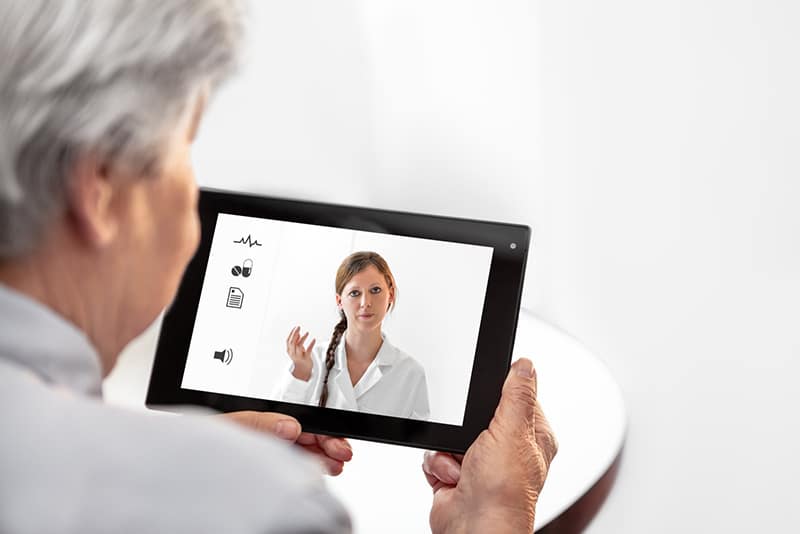Speech therapy and audiology services delivered via telehealth platforms – referred to as telepractice services by The American Speech-Language-Hearing Association (ASHA) – allows patients to safely get the services they need during the COVID-19 pandemic. Many providers outsource their billing and coding tasks to ensure accurate claim submission and reimbursement. An experienced medical billing company can help providers report the codes that correctly reflect their services, and comply with clinical and practice guidelines, state and federal laws and regulations, and payer policies.
Speech therapy and audiology telepractice services are reported and billed using the same CPT codes and guidelines as services provided face-to-face. As payers may have a specific list of CPT codes and modifiers approved for telepractice services, providers should always check with payers before rendering services. Appropriate place of service (POS) codes should also be appended on claims to indicate the specific place where services were provided. Telepractice POS can include schools, medical centers, rehabilitation hospitals, community health centers, outpatient clinics, universities, clients’ homes, residential health care facilities, child care centers, and corporate settings.
Updated List of CPT Codes for SLP and Audiology Services
In April 2020, the Centers for Medicare & Medicaid Services (CMS) issued waivers to expand the use of telehealth services. There were only a limited set of eligible audiology and SLP telehealth services in this list. On March 30, 2021, the Centers for Medicare & Medicaid Services (CMS) significantly expanded Medicare coverage for certain audiology and speech-language pathology (SLP) services delivered via telehealth.
- Audiology Services – Fifteen new CPT codes have been added to the existing covered audiology services during the public health emergency (PHE):
- 92550 Tympanometry and reflex threshold measurements
- 92552 Pure tone audiometry (threshold); air only
- 92553 Pure tone audiometry (threshold); air and bone
- 92555 Speech audiometry threshold
- 92556 Speech audiometry threshold; with speech recognition
- 92557 Comprehensive audiometry threshold evaluation and speech recognition
- 92563 Tone decay test
- 92565 Stenger test, pure tone
- 92567 Tympanometry (impedance testing)
- 92568 Acoustic reflex testing, threshold
- 92570 Acoustic immittance testing, includes tympanometry (impedance testing), acoustic reflex threshold testing, and acoustic reflex decay testing
- 92587 Distortion product evoked otoacoustic emissions; limited evaluation (to confirm the presence or absence of hearing disorder, 3-6 frequencies) or transient evoked otoacoustic emissions, with interpretation and report
- 92625 Assessment of tinnitus (includes pitch, loudness matching, and masking)
- 92626 Evaluation of auditory function for surgically implanted device(s) candidacy or postoperative status of a surgically implanted device(s); first hour
- 92627 Evaluation of auditory function for surgically implanted device(s) candidacy or postoperative status of a surgically implanted device(s); each additional 15 minutes.
- SLP services – Nine CPT codes have been added to list of covered SLP services during the PHE:
- 92526, Treatment of swallowing dysfunction and/or oral function for feeding
- 92607, Evaluation for prescription for speech-generating augmentative and alternative communication device, face-to-face with the patient; first hour
- 92608, Evaluation for prescription for speech-generating augmentative and alternative communication device, face-to-face with the patient; each additional 30 minutes
- 92609, Therapeutic services for the use of speech-generating device, including programming and modification
- 92610, Evaluation of oral and pharyngeal swallowing function
- 96105, Assessment of aphasia (includes assessment of expressive and receptive speech and language function, language comprehension, speech production ability, reading, spelling, writing, eg, by Boston Diagnostic Aphasia Examination) with interpretation and report, per hour
- 96125, Standardized cognitive performance testing (eg, Ross Information Processing Assessment) per hour of a qualified health care professional’s time, both face-to-face time administering tests to the patient and time interpreting these test results and preparing the report
- 97129, Therapeutic interventions that focus on cognitive function (eg, attention, memory, reasoning, executive function, problem solving, and/or pragmatic functioning) and compensatory strategies to manage the performance of an activity (eg, managing time or schedules, initiating, organizing, and sequencing tasks), direct (one-on-one) patient contact; initial 15 minutes
- 97130, Therapeutic interventions that focus on cognitive function (eg, attention, memory, reasoning, executive function, problem solving, and/or pragmatic functioning) and compensatory strategies to manage the performance of an activity (eg, managing time or schedules, initiating, organizing, and sequencing tasks), direct (one-on-one) patient contact; each additional 15 minutes (List separately in addition to code for primary procedure).
Ensure Comprehensive Documentation
Providers should ensure comprehensive documentation to support the medical necessity of the services provided. Justification for reasonable and necessary care and medical necessity can be achieved by meeting the criteria – Reasonable, Necessary, Specific, Effective, and Skilled (ASHA). Clinical documentation requirements depend on the specific setting and services provided and may include evaluation reports, intervention notes, progress notes, and discharge summaries. Lack of proper documentation can lead to claim denials. A physician billing company with expertise in audiology and telepractice billing and coding can help providers report the right codes, meet payer guidelines, and receive appropriate reimbursement.




